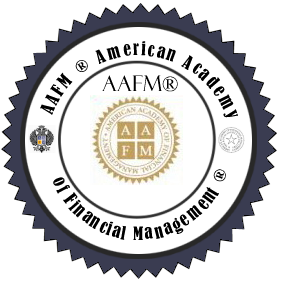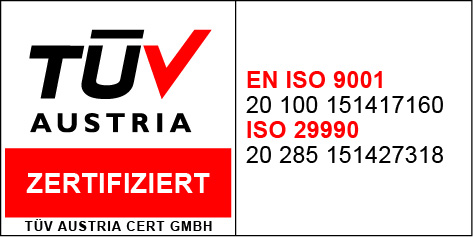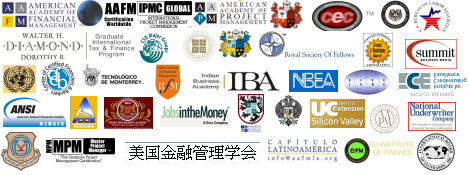
GAFM ® Global Academy of Finance and Management
International Board of Standards - Certification Accreditation
GAFM IBS Accredited Programs ™
The AAFM ® International Board of Standards is the 1st US EU Company to achieve TUV Accreditation for ISO 29990 Certified Training and 9001 Quality while working with Accredited Business and Law Schools Worldwide




AAFM ® American Academy of Financial Management ®
AAFM ® Certification - Level 2 Accredited Standards Worldwide
10 Things to Consider before Selecting a Wealth Manager or Financial Analyst
1. Experience - Make sure your advisor has a track record of success.
2. Accredited Education (Level 2) Preferred - Make sure your advisor has an education from a program that is accredited. Also, if the advisor has a degree or diploma from a Level 2 institution that has both regional accreditation and business accreditation, that is the best. As your advisor if he or she has a business degree from an ACBSP or AACSB accredited program.
3. Licenses - Are they licensed with the SEC or FINRA and do they have a record of good standing.
4. Government Professional License - Are they a lawyer or CPA. If so, check with the state bar association or AICPA to make sure they have a solid record.
5. Regulatory and Product Knowledge - Make sure your advisor has the ability to recommend a broad array of solutions for your wealth preservation and growth.
6. Qualifications - See if your advisor is a member of a prestigious body such as the CWM ® Chartered Wealth Manager Institute. Ask if they are board certified as an: Accredited Financial Analyst ® or Chartered Wealth Manger ®. Also, if they have a law degree and license or CPA, then they may also be competent to provide advice on tax law and estate planning.
7. Value and Compensation - How will your advisor earn income from you? Make sure they get paid for their work, but it may be best to make sure they are not double dipping. Some advisors will charge a fee for advice and then also invest you in a product that also has fees. With the ease of use of ETF Exchange Traded Funds, make sure your advisor is providing added value.
8. Wealth Team - Does the wealth manager have a group or team to help you in the areas of: Investing, Wealth Preservation, Risk and Insurance, Trusts, Legal, Retirement and Tax. Ask if they have names of people they have worked with successfully.
9. Customer Regulations - Be sure to let your advisor know what your objectives are. Make sure they understand your 1) suitability, 2) risk tolerance, and 3) time horizon. Ask the wealth manager to explain each of these to you in detail.
10. Policy Statement - Make sure your wealth manager provides you with an IPS Investment Policy Statement that outlines what they will do for you and the limitations involved.
*No investment, legal or tax advice is intended to be given herein. Please see a licensed professional before making any important decision.
Apply Now for Certification and (CUT/PASTE) Email Your Resume and Credential Information to us. APPLICATION
*Read about AAFM® Global Recognition. AAFM® has consulted with the US Government, United Nations, and other governmental bodies worldwide. These accredited education and exam requirements have been public and disclosed on governmental and authoritative guides for over a decade. As seen in the US Governments' Occupational Handbook.

Links

